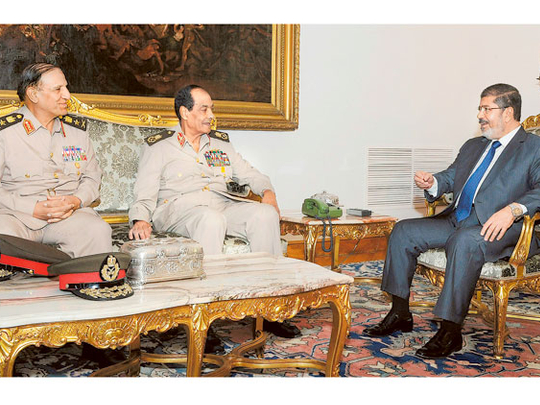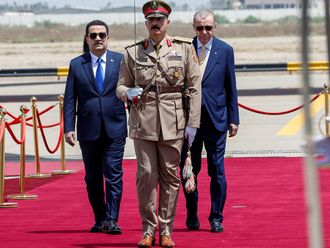
Cairo: Egypt’s new defence minister has pledged his “unwavering commitment” to the American-Egyptian military alliance, US Defence Secretary Leon Panetta said.
General Abdul Fatah Al Sissi also “stressed that he takes seriously Egypt’s obligations under the Camp David Treaty” with Israel, Panetta said, recounting at a Pentagon news conference yesterday a phone conversation with the general.
Egypt’s President Mohammad Mursi named new military leaders after ordering the retirement of the nation’s two top generals, Field Marshal Mohammad Hussein Tantawi and armed forces Chief of Staff Lieutenant General Sami Enan. Mursi had been locked in a tug-of-war with Egypt’s military council since he took office in June with the backing of the Muslim Brotherhood.
Voicing confidence that the Pentagon can work with the new military leaders, Panetta said Al Sissi “expressed his unwavering commitment to the US -Egypt mil-to-mil relationship, which has been really an anchor of stability in the Middle East for more than 30 years.”
The US provides $1.3 billion (DhXX) a year in military aid to Egypt.
Panetta said Al Sissi is “a highly experienced officer who has trained and spent a lot of time in the United States.”
The new defence minister attended the US Army War College from 2005 to 2006, according to Air Force Lieutenant Colonel Wesley Miller, a Pentagon spokesman. The war college, which trains military leaders and is accredited to award master’s degrees in strategic studies, is based in Carlisle, Pennsylvania.
Brotherhood’s Success
Egypt’s military council has signalled it won’t challenge Mursi’s shake up. The leadership change was “natural” and responsibility has shifted “to a new generation of Egypt’s sons to begin a new journey” to protect the nation, according to a statement posted August 13 on a Facebook page affiliated with the council.
“This was probably the Brotherhood’s greatest tactical success, that it was able to build strong-enough links with some members of SCAF in order to exploit personal differences and tap into opportunism rather than ideology,” Hani Sabra, a Middle East analyst with the Eurasia Group, wrote in an emailed note. Members of the Supreme Council of the Armed Forces “essentially want to benefit financially from advancing in military ranks.”
Mursi was able to convince some senior generals, such as Al Sissi, that “it would be better for them to tie their fortunes to the Brotherhood and ‘democracy’ rather than the old guard,” Sabra said.
Daily Protests
Egypt’s Islamist president has been struggling to restore calm since being sworn in. Daily protests and power and water cuts have further angered Egyptians already weary of the unrest of the past 18 months.
The nation’s economy has struggled to rebound since last year’s uprising, with political infighting and security lapses creating the country’s worst economic crisis in more than a decade. Foreign reserves dropped to $14.4 billion (Dh 52.892 billion ) in July from about $36 billion (Dh132.231 billion) at the end of December 2010. A $3.2 billion (Dh 11.753 billion) International Monetary Fund loan sought for more than a year has yet to be approved.
Mursi’s retirement of Tantawi followed a shake-up in top security posts after militants killed 16 soldiers in the Sinai on August 5. Panetta said yesterday that Al Seesi is “committed to preventing the Sinai from becoming a staging area for militants.”
Tantawi held the post under Mubarak for 20 years and was re-appointed to the defence portfolio in Prime Minister Hisham Qandil’s government.
‘Too Much Power’
The president’s push to bolster civilian rule may backfire if he tries to retain new powers indefinitely, said Omar Ashour, director of Middle East studies at the University of Exeter in the UK and a visiting fellow at the Brookings Doha Center.
“It’s too much power, definitely, in the hands of one man,” he said in a telephone interview. “One thing is for sure: if he heads for authoritarianism, he’ll be opposed.”
A new constitution that would define the authority of the presidency has yet to be drafted.
Mursi named new commanders for the navy, air defence and air force, the state-run Nile News channel reported yesterday.
Abdul Moneam Ibrahim Bayoumi was appointed head of the Air Defence Command, Osama Ahmad Al Gendi as leader of the navy and Younis Hamad Al Masry as head of the Egyptian air force, it said.











